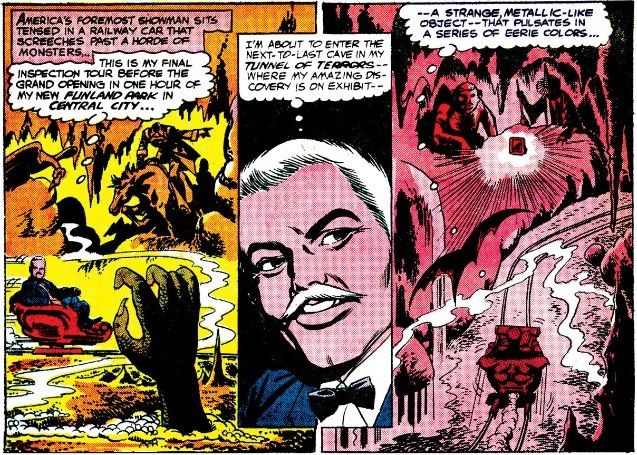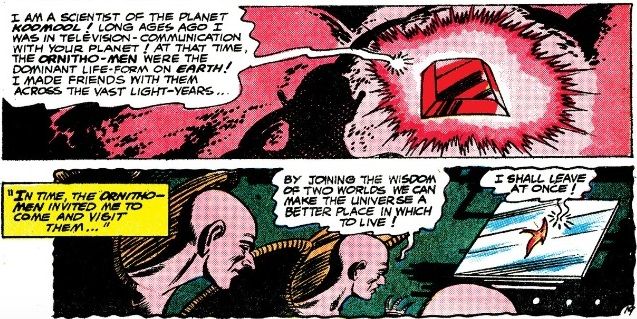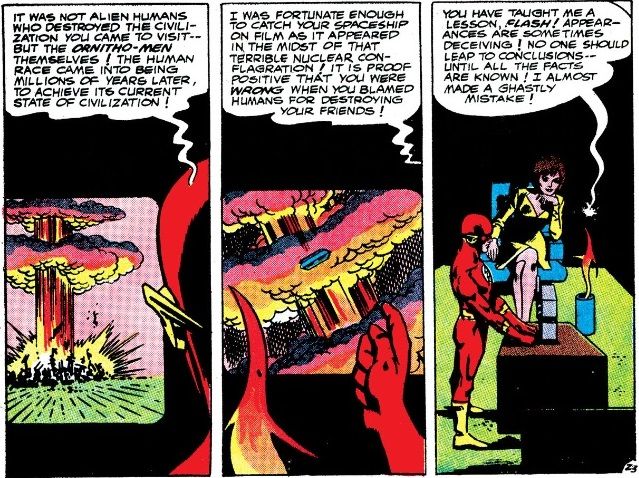This story, entitled “Who Haunts the Corridor of Chills?” appeared in Flash #162, published in 1966. It starts with theme park impresario Walt Dempsey wandering through his own attractions at night. While Dempsey is not drawn to explicitly resemble Disney, you can definitely see the influence in the white hair and mustache. Right in the middle of the tour, some unknown force turns Dempsey into a man-bird monster. (The Flash seems fond of those.) The mutated Dempsey goes on a rampage, destroying his own theme park until Flash, unaware of the creature’s true identity, punches him back to normal. The Flash traces the origins of Dempsey’s weird transformation to the Tunnel of Terrors ride. He immediately falls prey to the strange force in the tunnel: gripped by fear, he refuses to even go inside. It isn’t until his reporter girlfriend Iris goes in to take pictures that he snaps out of it. Good thing he does, since, in typical-for-the-time girl reporter fashion, Iris is immediately accosted by all manner of creepy monsters. Thanks to Iris’s camera flash, which shakes the Flash out of his illogical fear, he realizes that whatever is causing these strange happenings is sensitive to light. He uses that knowledge to go deep into the Tunnel of Terrors, where he confronts a, uh, talking alien gemstone named Vardar Varr. This oughtta be good. Before humanity, Earth’s dominant species was these ornitho-men, who invited their intergalactic pen-pal Vardar for a visit. Vardar arrives just as a nuclear war breaks out, driving the ornitho-men to extinction and trapping Vardar underground for a whopping 90 million years. (I hope he at least brought a book to read.) He is finally freed when Dempsey’s men excavate the area for the theme park, and Dempsey, charmed by Vardar’s appearance, incorporates him into the ride, unaware that Vardar is sentient. Vardar, assuming that humanity was responsible for the war that wiped out the ornitho-men, vows revenge. Look, I like Steven Universe, and I like Star Trek IV, but there are some properties that should never come anywhere near each other, and apparently, these are them. In case this issue hasn’t gone far enough off the rails for you yet, we’re not done. The Flash points out the obvious flaw in Vardar’s logic — that humanity didn’t have nuclear weapons 90 million years ago — and proves it to him by using his cosmic treadmill to go back in time and catch the ornitho-men’s destruction on tape. That’s got to be the most depressing home movie ever. After getting his ship fixed, Vardar apologized for plotting to destroy humanity and goes home. He promises to keep in touch and exchange knowledge with the people of Earth, but since this was his only appearance, I guess he never bothered. Can’t trust those alien gemstones, I tell ya. In the last panel, we are reminded that Fake Walt Disney is in this comic, as Dempsey finally opens his theme park. That sure was a comic, wasn’t it? How in the world did something this bonkers get published, anyway? A couple of lucky coincidences, probably. First, what’s up with the bargain-store Disney? Why did DC decide to pick on him? He may have just been on the creators’ minds at the time: less than a year before this comic came out, Disney made his first public announcement regarding plans for Walt Disney World in Orlando. Someone at DC probably saw the headlines and drew inspiration from them. This was also about the time when Flash comics started slowly but surely moving toward the extra-weird: Flash spent less time fighting his traditional cadre of supervillains and more time squaring off against generic thugs and bizarre, supernatural situations. Eventually, spiritual undertones started coloring the narrative as well, with characters seen praying or speculating about religious miracles for the first time. Ghosts, demonic cults, and creatures from hell became the norm. That’s fine for a guy like Doctor Strange, but the Flash? It never quite seemed to fit. This fortuitous confluence of events — the Disney World announcement and Flash‘s interest in the supernatural — may have allowed Flash #162 to exist, a fact for which we are eternally…grateful? Anyway, whatever you think of Disney and his legacy, as we mark the 50th anniversary of Disney World’s official opening, it’s nice to remember the simple days when a sentient space rock could turn one of America’s visionary entertainers into a raging bird-man.



